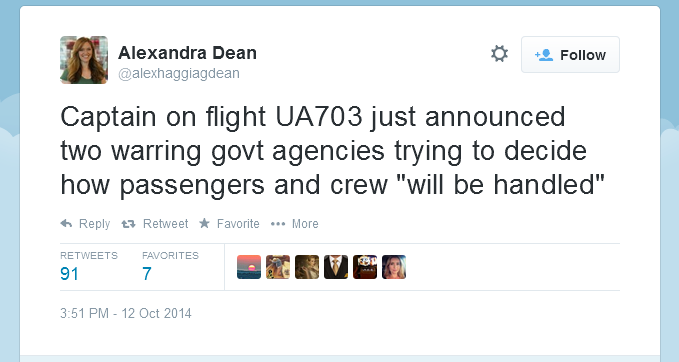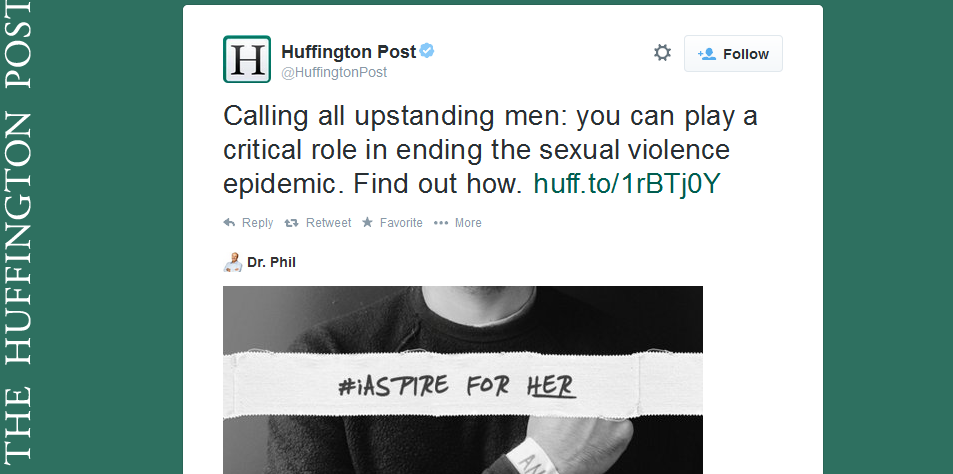
Michelle Malkin recently eviscerated scope creep in the Centers for Everything But Disease Control and The Federalist’s David Harsanyi highlighted further areas where the CDC has wasted Americans’ money and veered off mission instead of, you know, protecting our country from Ebola and other potential contagions.
The CDC can’t afford to keep a aerial ’bio-containment unit’ on retainer, but it does have museum, a massive staff and a lots of waste and fraud. In 2007, Senator Coburn’s office authored a 115-page report detailing things like the CDC budget gimmicks, the agency’s hundreds of millions of dollars of waste on junkets and elaborate digs and its institutional failures to actual ‘control diseases’ – and this includes AIDs prevention.
It serves as a stark example of what conservatives mean when they champion limited government. It’s not “no government,” it’s not necessarily small government; it’s pinpointing the unchecked growth of the scope and mission of government as the problem. Using limited-government principles wouldn’t leave people “on their own,” it would focus on things that matter for the general welfare.
Even a moderate interpretation of “general welfare” in Article 1 Section 8 of the Constitution means government spending should be directed in endeavors that benefit everyone. No really, check the dictionary: “General—affecting or concerning all or most people, places, or things; widespread.” That seems like a decent barometer to start with checking the scope for any government agency. Disease control could rightly be characterized as necessary for the common defense of our nation.
Instead, we have a situation where the Centers for Disease Control appears to be surprised that its main mandate should be disease control. As Malkin highlighted, the CDC has for years spent time on the salt level in American’s diets, helmet laws, video games, TV violence, and social norms in schools instead of its central purpose.
Here are five ways the government is failing on the Ebola crisis right now.
1. Insisting a targeted travel ban will not help.
The stranger implication is that doing so is somehow racist. So far, no one has questioned the “racist” African nations instituting travel restrictions to protect their populations. Both Senegal and Nigeria are having success using travel bans to eliminate any further cases within their borders. “The virus is moving on virus time; we’re moving on bureaucracy or program time,” Michael Osterholm, director of the Center for Infectious Disease Research and Policy at the University of Minnesota, told the Washington Post. “The virus is actually picking up the pace. Even as we add resources, we get farther behind.” The math is clear:
Scientists have used Ebola disease spread patterns and airline traffic data to predict a 75 percent chance the virus could be imported to France by October 24, and a 50 percent chance it could hit Britain by that date.
Those numbers are based on air traffic remaining at full capacity. Assuming an 80 percent reduction in travel to reflect that many airlines are halting flights to affected regions, France’s risk is still 25 percent, and Britain’s is 15 percent.
2. An incompetence ‘epidemic.’
To recap, we have had a patient in Dallas inform doctors that he had recently traveled from an Ebola hot zone, present himself with a fever, and they sent him home. After he returned to the hospital because the disease progressed to the point that the infection was self-evident, the two nurses that cared for him were diagnosed with Ebola. The CDC director speculated they got sick because of “makeshift protective measures” in their hospital.
This is the same CDC who, after one nurse began treatment, told a second nurse to go ahead and fly after she had informed the CDC she had been treating the Dallas patient and had a fever. Once the CDC confirmed that Amber Vinson had Ebola, it issued a statement suggesting that the folks on her flight to Cleveland call the CDC. It occurred to them six days later that they should also consider contacting folks who were on Vinson’s original flight from Dallas to Cleveland.
3. A presidential failure to cultivate leadership, while focusing on optics management, instead.
President Obama made a spectacle of kissing nurses and reassuring us that it’s unlikely “ordinary folks” would get infected, even as “ordinary folks” like Nina Pham and Amber Vinson receive treatment for Ebola and “ordinary folks” flew with the nurse while she was symptomatic.
The lack of oversight is evident when you consider how even a false alarm on this past Sunday was mismanaged at the same airport President Obama flew from after a fundraiser at Gwyneth Paltrow’s home. United Flight 703 was grounded at LAX October 12after arriving from JFK, an airport that had instituted “enhanced screening” the day before. A passenger on board was vomiting and exhibiting flu-like symptoms. Alexandra Dean was on the flight, and shared her experience on Twitter. They “have been kept on the plane for 1.5 hours… No information. 10 month old on board. Met the plane w haz mat team.” She noted the fire department had been putting on protective gear and circling the plane for a half hour. Eventually, the hazmat team came on board, without gear, and removed the patient. What the captain shared with passengers as they were waiting should make everyone further question the federal government’s preparedness:
 At this point, with one patient who had flown from Liberia, presented symptoms at a Dallas hospital, and died, government officials should have been aware of the risk for an Ebola passenger on a U.S. flight. But we see that no leadership had demanded that agencies establish what basic procedures to execute when the expected occurs.
At this point, with one patient who had flown from Liberia, presented symptoms at a Dallas hospital, and died, government officials should have been aware of the risk for an Ebola passenger on a U.S. flight. But we see that no leadership had demanded that agencies establish what basic procedures to execute when the expected occurs.
Kissing a nurse on TV isn’t the same as ensuring aligned and effective management plans are in place to aid in coordination with airlines, major airports, and hospitals across the country. Hope is not a plan, and optics isn’t leadership.
4. Government scope creep and accelerating regulatory burden on the private sector.
These are key factors that are directly contributing to the reduction in efficiency and effectiveness of our medical system. The regulatory burden imposed on companies, hospitals and every other profession burdens employees with rafts of often useless training. Rarely can an organization prioritize what training is mission critical.
Is diversity training in a hospital more important that hazardous material protocols and appropriate disease containment measures? A logical person would say no, but government rules do not allow for rational prioritization and instead let special interests weigh down all professions with gluts of often-frivolous training that only protects an entity from lawsuits instead of educating employees. If you pull the training records of the nurses now infected with Ebola, it’s quite likely they are all up-to-date on their sexual harassment training, diversity training, and so forth, while they were unprepared to manage an Ebola patient.
This is the world the Left has crafted, world where diversity training is considered equivalent to the core competencies necessary to perform a role safely and effectively.
5. An absence of critical thinking among our elites.
Our elites, who label things like rape culture, sexual violence, and whatever wedge issue de jour as epidemics, fail to act when faced with a real one.
 If a rapist sneezes on you, you will not become a rapist. Ebola is contagious, yet there appears to be little interest in no more Ebola. Neither is Ebola racist. The virus has no demonstrated preference for skin tone. Discussing rational approaches to containing the spread of the epidemic is not racist, it’s a rational reaction to a deadly virus. To prioritize “hurt feelings” of MSNBC news anchors over protecting Americans demonstrates a dearth of prioritization skills. It does not make our elites superior to “ordinary folks,” it only signals how protected they presume themselves to be in the world.
If a rapist sneezes on you, you will not become a rapist. Ebola is contagious, yet there appears to be little interest in no more Ebola. Neither is Ebola racist. The virus has no demonstrated preference for skin tone. Discussing rational approaches to containing the spread of the epidemic is not racist, it’s a rational reaction to a deadly virus. To prioritize “hurt feelings” of MSNBC news anchors over protecting Americans demonstrates a dearth of prioritization skills. It does not make our elites superior to “ordinary folks,” it only signals how protected they presume themselves to be in the world.
We have an incompetence “epidemic” at multiple levels of government that is spreading exponentially and infecting the private sector. Despite government’s best efforts to frame itself as savior, and failing almost laughably in the process, the private sector is paving the way to eventual victory over Ebola.
Here are five ways the private sector is working right now to address the Ebola dangers, despite government incompetence and barriers.
1. Invention.
The experimental drug called ZMAPP was developed by the biotech company Mapp BioPharmaceutical Inc., based in San Diego. This treatment hadn’t been tried on humans previously, but contributed to saving the American missionary workers in Liberia. Doctors carried out this experimental usage despite guidance from authorities: “World Health Organization spokesman Gregory Hartl cautioned that health authorities ‘cannot start using untested drugs in the middle of an outbreak, for various reasons.’” Dr. Kent Brantley and Nancy Writebol, the infected missionaries, thankfully ignored such advice and volunteered to take the risk, meaning they have aided in proving the efficacy of this treatment in humans. Mapp is working with skilled manufactures increase the production of their cocktail of three monoclonal antibodies, which appear to bind and neutralize the Ebola virus.
2. Expertise.
Look at what Firestone Tire did at its rubber plantation in Harbel, Liberia.
Firestone detected its first Ebola case on March 30, when an employee’s wife arrived from northern Liberia. She’d been caring for a disease-stricken woman and was herself diagnosed with the disease. Since then, Firestone has done a remarkable job of keeping the virus at bay. It built its own treatment center and set up a comprehensive response that’s managed to quickly stop transmission. Dr. Brendan Flannery, the head of the U.S. Centers for Disease Control and Prevention’s team in Liberia, has hailed Firestone’s efforts as resourceful, innovative and effective.
Ed Garcia, Firestone’s general director, was quoted as saying, “None of us had any Ebola experience.” They did have experience in acting decisively to manage tricky situations. They worked to clear out buildings and set up an isolation ward. They immediately quarantined the woman’s family and prevented the spread of infection to anyone else at Firestone, including those who had cared for the infected woman.
3. Charity.
Bill Gates had already pledged $50 million to fight Ebola. Now a partnership with Amgen, the world’s largest independent biotech firm, and the Bill and Melinda Gates Foundation has been put in place to investigate how using hamster cells could enable mass production of the monoclonal antibody cocktail Mapp Biopharmaceutical invented, using 12 to 14 staff scientists in a facility in Seattle.
4. Automation.
A company called Xenex produces “virus killing robots” that have been used in Texas to fight Ebola “by using light to disinfect contaminated rooms. It’s already being used in 250 hospitals across the country and interest in the robots in recent weeks has surged, according to the company.”
5. Individual Initiative.
As CNN reported, 22-year-old Fatu Kekula cared for four of her family members in West Africa.
Her father. Her mother. Her sister. Her cousin. Fatu took care of them all, single-handedly feeding them, cleaning them and giving them medications.
And she did so with remarkable success. Three out of her four patients survived. That’s a 25% death rate — considerably better than the estimated Ebola death rate of 70%.
Fatu stayed healthy, which is noteworthy considering that more than 300 health care workers have become infected with Ebola, and she didn’t even have personal protection equipment — those white space suits and goggles used in Ebola treatment units.
Instead Fatu, who’s in her final year of nursing school, invented her own equipment. International aid workers heard about Fatu’s ‘trash bag method’ and are now teaching it to other West Africans who can’t get into hospitals and don’t have protective gear of their own.
The next time someone says, “You didn’t build that,” remind them of Fatu Kekula. She did build that. When it comes time to tax the rich, remember the good charity can do. And when those politicians rage against private-sector companies think of the virus zapping robots, and medical inventions that save lives while government agencies cautioned against experimenting with new approaches in the field. Crises are an excellent opportunity to remind us all where greatness lies: in people, not government.







